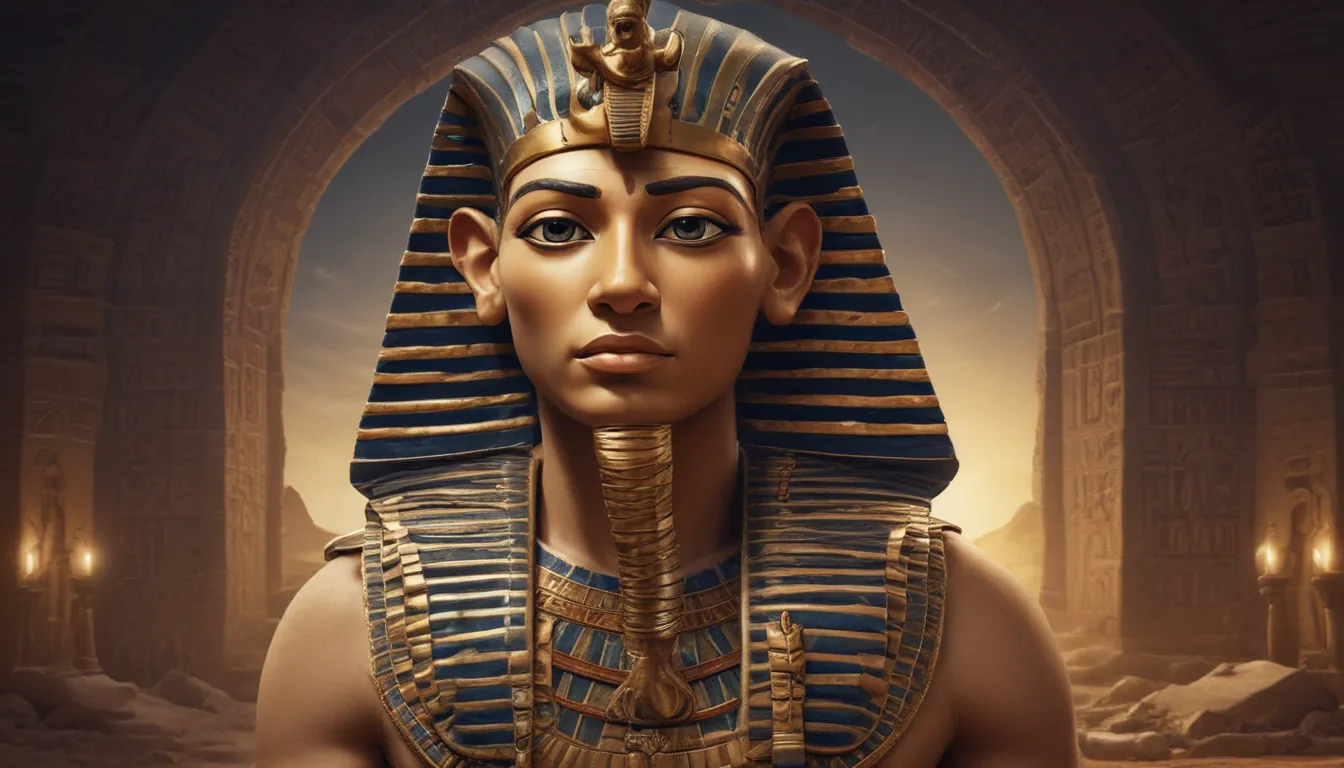The images in our articles may not match the content exactly. They are used to grab your attention, not to show the exact details in the text. The images complement the text but do not replace it.
Have you ever been curious about the enigmatic figure who kick-started the long and storied history of ancient Egypt? Menes is the answer to that question, a legendary ruler shrouded in mystery and surrounded by feats that seem straight out of a legend. Often celebrated as Egypt’s first pharaoh, Menes is credited with the monumental task of uniting Upper and Lower Egypt into a single, powerful kingdom. But who was Menes, really? Was he a singular historical figure, a combination of multiple rulers, or a mythical king whose legend grew over time? Strap in, history buffs and inquisitive minds, as we delve into the captivating world of Menes. Get ready to discover fascinating facts about this pivotal figure in Egyptian history, exploring his achievements, the myths that surround him, and why he remains a crucial character in the annals of history. Are you prepared to travel back in time to ancient Egypt? Let’s embark on this historical journey together!
Unveiling the Enigma: Who Was Menes?
Menes, a name cloaked in mystery and legend, is often hailed as the unifier of Upper and Lower Egypt and the founder of the First Dynasty. His reign marked a significant transition in Egyptian history, ushering in an era of written records and monumental architecture. Despite the debates among historians and Egyptologists about his true identity and existence, Menes undoubtedly holds a pivotal place in the annals of ancient Egyptian history.
The Monumental Unification of Egypt
-
Menes is renowned for the colossal task of uniting Upper and Lower Egypt, a monumental achievement that laid the groundwork for Egypt’s future as a formidable and unified kingdom. This unification was not merely a tale of military conquest but also a testament to diplomacy and strategic planning.
-
Establishing the city of Memphis as the capital of the newly unified Egypt was a strategic masterstroke by Menes. Positioned at the apex of the Nile Delta, Memphis served as a crucial cultural, political, and economic hub throughout ancient Egyptian history.
Revolutionary Innovations and Contributions
-
Menes introduced the concept of a centralized government in Egypt, a revolutionary move during that era. This innovative system facilitated the more organized and efficient administration of the vast lands and resources of the Nile Valley.
-
Additionally, Menes is credited with spearheading the construction of dams and irrigation projects. These groundbreaking innovations significantly boosted agricultural productivity, supporting a burgeoning population and economy in ancient Egypt.
-
The introduction of writing during Menes’ reign marked a watershed moment in Egypt’s history. This progression enabled the documentation of events, transactions, and the inception of a rich cultural heritage that would endure for millennia.
Influence on Religion and Culture
-
Menes played a pivotal role in shaping the Egyptian religious system, often depicted as a divine figure in later Egyptian mythology. This portrayal underscores his significance in both the political and spiritual realms of ancient Egypt.
-
The cult of the pharaoh, a cornerstone of Egyptian religion that endured for centuries, is believed to have its roots in the era of Menes. This cult emphasized the pharaoh’s divine status and his role as a mediator between the gods and the people.
Tracing Menes in Historical Records
-
References to Menes, the historical figure, can be found in various ancient Egyptian texts and records. However, these accounts are typically sparse and interwoven with mythological elements, making it challenging to separate fact from fiction.
-
Notable archaeological discoveries, such as the Turin Royal Canon and the Abydos King List, include Menes in the roster of pharaohs, offering tangible evidence of his historical existence and reign.
Enduring Legacy and Contemporary Interpretations
-
Menes’ legacy stands as a testament to his profound impact on Egyptian civilization. His accomplishments in uniting Egypt, establishing Memphis, and laying the foundations for the Pharaonic state are significant milestones in ancient Egyptian history.
-
Modern scholars continue to debate Menes’ true identity, with some suggesting a potential connection to Narmer, another pharaoh credited with unifying Egypt. This scholarly discourse underscores the complexities of ancient Egyptian history and the fusion of historical and mythological narratives.
-
Despite the uncertainties surrounding his life, Menes remains a symbol of ancient Egypt’s ingenuity and ambition. His narrative continues to captivate scholars and enthusiasts alike, shedding light on the multifaceted history of this ancient civilization.
-
Ongoing archaeological discoveries offer fresh insights into the period of Menes’ reign, providing new perspectives on Egypt’s formative years as a unified state. These findings help piece together the puzzle of Egypt’s early history.
-
The allure of Menes extends beyond academic circles, as he has become a compelling figure in popular culture. From novels to films to documentaries, Menes’ story is a wellspring of fascination that explores the mysteries of ancient Egypt.
-
Ultimately, Menes’ tale serves as a poignant reminder of the enduring legacy of ancient civilizations. Whether fully comprehended or shrouded in mystery, his achievements continue to captivate global audiences, underscoring the timeless intrigue of Egypt’s ancient past.
A Glimpse into the Foundational Leader of Ancient Egypt
Venturing through the sands of time, we unveil the legacy of Menes, the unifying force of ancient Egypt. His story transcends mere historical accounts; it embodies leadership, innovation, and the immortal spirit of human civilization. Menes’ founding of Memphis and establishment of the first dynasty signify a pivotal juncture in history where culture, politics, and society took significant strides forward. His contributions laid the groundwork for a civilization that would dazzle the world for millennia. As we contemplate Menes’ life and endeavors, let’s cherish the layers of history that have sculpted our present. His legacy, interwoven with myths and truths, continues to ignite curiosity and admiration for one of humanity’s most enthralling epochs. Indeed, Menes stands as a monumental figure in history, bridging the chasm between myth and reality, and reminding us of the potency of human ambition and accomplishment.
Frequently Asked Questions
Q: Who was Menes, and why is he significant in history?
A: Menes is often hailed as the founder of the First Dynasty of ancient Egypt and the unifier of Upper and Lower Egypt. His reign heralded a dynastic and cultural era that laid the groundwork for much of Egypt’s subsequent grandeur.
Q: How did Menes achieve the unification of Egypt?
A: Through a blend of military conquest and diplomatic alliances, Menes successfully amalgamated the distinct regions of Upper and Lower Egypt into a single, centralized kingdom. The symbolism of the Pharaoh’s double crown epitomized this fusion of lands.
Q: What were some major accomplishments of Menes?
A: Beyond unifying Egypt, Menes is credited with establishing the city of Memphis, which served as the capital of ancient Egypt for centuries. He also pioneered the first centralized government and launched numerous construction projects, including temples and irrigation systems.
Q: Is there controversy surrounding Menes’ identity?
A: Indeed, there is debate among historians about whether Menes was a genuine historical figure or a legendary amalgamation of several early rulers. Furthermore, the question of whether Menes and Narmer, another early pharaoh, were the same person adds to the intrigue.
Q: How did Menes meet his demise?
A: Accounts of Menes’ death abound with legendary tales, including one suggesting he was slain by a hippopotamus. However, due to the scarcity of contemporary records, the true circumstances of his death remain a mystery.
Q: Why is Menes not as renowned as other Egyptian pharaohs?
A: Despite his pivotal role in Egyptian history, Menes does not enjoy the same level of fame as later pharaohs like Tutankhamun or Cleopatra. The scarcity of surviving artifacts and records from his era contributes to his relative obscurity.
Q: How do historians and archaeologists glean information about Menes?
A: Knowledge about Menes is derived from a blend of archaeological evidence, such as inscriptions and artifacts, and ancient writings by historians like Herodotus and Manetho. These sources, though occasionally fragmentary, yield valuable insights into Menes’ reign and accomplishments.
Conclusion
Unraveling the enigma of Menes, the first pharaoh of Egypt, reveals a tapestry of leadership, innovation, and cultural legacy that continues to captivate and inspire audiences worldwide. His imprint on ancient Egyptian civilization, from unifying the kingdom to fostering cultural advancements, underscores his enduring significance in history. As we traverse the corridors of time to explore Menes’ legacy, we encounter a figure who bridges the realms of myth and reality, reminding us of the indomitable spirit of human achievement. The allure of Menes persists, beckoning us to delve deeper into the mysteries of ancient Egypt and to cherish the enduring tapestry of our shared history.






